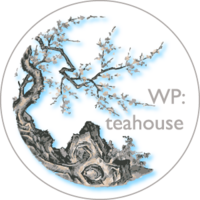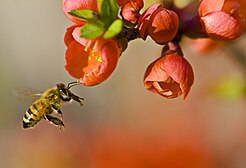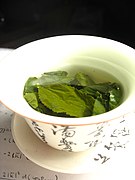Wikipedia:Teahouse/The menu

This is a description of the kit of parts developed in 2012 for the Teahouse pilot project. This page presents images and templates together with project intentions, to facilitate taking the concept to other wikis, languages, etc.
- See the overview of the Teahouse Project here.
- See the Teahouse engagement tips for working with new users too, because Teahouse is about people as much as code.
Note: a number of elements of the original Teahouse design, described below, have since been marked as 'historic' in the >10 years the Teahouse has been operating.
Teahouse Main Pages
- These are the four main pages of Teahouse.
- Teahouse on IRC: IRC is currently open for hosts at #wikipedia-teahouse. JBot_RC notifies the channel when change are made to Teahouse pages. The IRC channel is technically open to all, but is only advertised on host-facing pages (such as the Hosts' lounge).
Home page
Overview: this is the Teahouse landing page. From here, new editor will be able to navigate directly to one of the three main sub-pages: the Q&A page, the Host Introductions page, and the Guests Introductions page. None of the content of this page is meant to be directly edited by new users.
Features:
- Recent questions: a (transcluded template) box which contains one or more questions that were posted recently on the Q&A page. This box should also contain one or more links to the Q&A page.
- "Find the answer here" link, which is meant to go to the question shown. This set of questions is currently updated semi-weekly with a Python script.
- Featured guest(s): a (transcluded template) box which contains a picture, username and a short biographical blurb of one or more Teahouse guests, submitted on the Guest Introductions page.
- Featured host(s): a (transcluded template) box which contains a picture, username and a short biographical blurb of one or more Teahouse hosts, submitted on the Host Introductions page.
- Currently these features are rotated when someone clicks "see another host" "see another guest" or "see another question." Clicking any of these links purges the page cache. Each of these boxes randomly updates to a new question, picked from a set of questions, using the random subpage template every time the page cache is purged.
Guest introductions (No longer used. Page now marked as 'historic')
Overview: This is the page where Teahouse guests introduce themselves. New editors are encouraged to create a templated introduction that says something about themselves. Guests can also browse other guests introductions. Our goal is to make it as easy as possible for guests to create an introduction for themselves, and to edit that introduction later. Since we're explicitly inviting guests to edit this page, we should make it very clear how to do so, and what parts of the page are meant to be edited.
Features:
- Introduce yourself: a call-to-action feature that allows guests to create pre-formatted introduction box for themselves.
- Guests are taken to another page where they are invited to fill out a simple template with basic information.
- Guest profile: A template where guests can put a little information about themselves. The profile contains fields for username, realname (or what they would like to be called), a quote and an image. Example below:
{{Wikipedia:Teahouse/Guest
<!-- fill in the four fields below-->
|username=Username
|realname=Name
|quote=This is the quote
|image=
}}
Host Introductions
Overview: this is the page where Teahouse hosts introduce themselves. Hosts are encouraged to create a templated introduction that says something about themselves. Guests who visit this page will want to browse hosts introductions and photos (hosts are encouraged to use an actual photo of themselves, and many do). Our goal is to allow hosts to present themselves as knowedgable, friendly, fun and above all as real people. We do not want guests to edit this page directly, but we do want to present them with some information about what the "host" role is all about. These intros can be set up to either explicitly encourage guests to contact hosts directly via the host's user page, or to downplay one-on-one interactions. On the one hand, it is desirable to direct questions to the Q&A board. On the other, if a guest sees a host who shares their interests, they should be able to talk to that host. Hosts may also desire to directly mentor interested guests.
Features:
- Meet your hosts: static text that explains who Teahouse hosts are, what they do. Possibly also a reminder that questions are answered on the Q&A board (with link to same)
- Host profiles: pre-formatted profile boxes where hosts can put a little information about themselves. The profiles contain some number of distinct fields, which could be either optional or required. Example below:
{{Wikipedia:Teahouse/Host
|username=Username
|description=This is the host description of [[WP|]] interests and expertise with links
|quote=This is the quote
|image= Image.jpg
}}
- Design considerations
- Fields include a picture; interests (e.g. copyediting, zoology, JSON); real name; location. Anything, really, but we should keep it relatively simple.
- On Enwiki Teahouse, the host intro template automatically links the host's displayed username to their user page. Linking to the hosts' userpage (but not their talk page) encourages further exploration by guests and even interaction between guests and hosts, while not explicitly instructing guests to post questions on the hosts' individual pages (we're attempting to strike a balance here).
- Table of contents: a table of contents might be useful on this page if the number of host profiles grows very large.
- Design considerations
- I would prefer the TOC be displayed as a sidebar, so that it doesn't push the main content of the page (the profiles themselves) below the fold. Possibly the TOC could also be hidden by default.
- Design considerations
Q&A Board
Overview: This is the most interactive page on Teahouse. Our goal was to make this page a natural "first stop" for new guests. The page should make it easy, comfortable and desirable for guests to ask any kind of question they might have, without having to search an archive, or read a FAQ... or think at all, really. Plain and simple, they should be able to see that questions are getting answered promptly and politely, see that they are invited to ask one now, and be able to just do it.
Features:
- Ask a question this is one of the most important features of the Teahouse! Users click the link, fill in a subject line (section heading) and a free text field and click Submit/Edit. Their question is then posted to the top of the board. The question form also has the benefit of both prompting and requiring that the user to sign their post with four tildes.
Code for the "Ask a Question" box
Here is where you find all the gadget definitions: Gadgets-definition
This is the main definition for the Teahouse gadget: Gadget-teahouse.js
That page pulls code from this page (where most of the code lives): Gadget-teahouse/content.js
- Design considerations
- in order to make Teahouse accessible to the new users we're inviting (for instance, newbies who created their account less than 24 hours ago, and have already made 10+ edits), we need to present them with as few hurdles as possible. A button is much more user friendly than an "edit" link to people who aren't wiki-savvy. A free-text field is much more friendly than a page full of wikitext.
- Static introductory text this should be minimal. It should not take up very much screen real estate: actual questions submitted by actual users should be visible above the fold. Contrast this with the Help Desk, or many other Q&A spaces on WP, which display hundreds (thousands?) of words of caveats, directives, prescriptions, proscriptions and other 'helpful' instructional material before the user is given the option to ask a question.
- Comment board this is where all the questions and comments live, each question will be the start of a new page section/comment thread. Comment threadsare displayed in reverse chronological order,
- when the user asks their question, it should be added as a new section at the top of the board. We want the newest questions to be the first ones a brand new visitor sees, in order to communicate to them that Teahouse is an active space (as opposed to many other boards, pages and forums on Wikipedia). Also, posting new entries to the bottom may be counterintuitive to newbies: in most social media, and in many, many Q&A forums[1][2][3][4] newer stuff is listed first. On the other hand, most other discussion boards on WP post newer stuff at the bottom, including other Q&A boards like the Help Desk. There are reverse chronological order boards and feeds on Wikipedia, though, such as this one and this one, so the top-posting style is not entirely unprecedented on the site.
- hosts and new users should be able to respond to other users questions by clicking an "edit" link next to the section heading for that question. We probably don't need to make this a special feature, though, since hosts and more experienced newbies will be confident using normal talk page discussion conventions.
- Table of contents a table of contents will be essential on this page, since we expect there to be many comments, and want users to be able to browse them easily
Q&A non-Javascript fallback
If the user viewing the Q&A page does not have Javascript enabled on their browser, the Question-form template defaults to posting the new question to the bottom of the page.
Teahouse Back-of-House Pages
(No longer used. Page now marked as 'historic'. Please use: Wikipedia talk:Teahouse for all discussions on managing the Teahouse )
Transclusions
{{Wikipedia:Teahouse/Host_lounge/Announcements}}
Host resources
The following resources have been designed by Teahouse hosts to serve as guides and talking points to use when working with new editors.
- Wikipedia:Teahouse/Host lounge/Invite guide
- Your step-by-step guide on inviting new editors to the Teahouse.
- Wikipedia:Teahouse/Host lounge/Expectations
- Expectations of the hosts while interacting in the Teahouse.
- Wikipedia:Teahouse/Host lounge/How-to guides
- Talking points for hosts to help explain complex tasks or policies in simple ways.
- Wikipedia:Teahouse/Host lounge/Templates
- One-stop shopping for all of the Teahouse templates.
- Wikipedia:Teahouse/Host lounge/User scripts
- Helpful easy to install user scripts (with instructions) to make your job as host MUCH easier.
- Wikipedia:Teahouse/Host lounge/Project contacts
- Contacts for Wikiprojects, sister projects and other areas of Wikimedia that might interest new editors.
Other talk pages redirected here
Teahouse Transcluded Pages/Major Templates
Basic Page Elements
{{Wikipedia:Teahouse/Header|title=page title}}
{{Wikipedia:Teahouse/Links}}
{{Wikipedia:Teahouse/Intro|intro=This is the intro.}}
{{Wikipedia:Teahouse/Question-form}}
{{Wikipedia:Teahouse/Question-box}}
Recent questions—
Folks, I've found 2 references to the same primary source in 2 different sections of the same wp article. Those references were numbered automatically. How does one go about "merging" those 2, so that the reference only appears once? I don't know if I've made myself clear. The same primary source is listed as references 26 AND 47. How can the article be changed so that there is only 1 reference, say 26, while changing the superscripted 47 to 26 in the text? Thanks, DennisPietras (talk) 02:31, 8 January 2017 (UTC)
{{Wikipedia:Teahouse/Footer links}}
Learn more about the Teahouse at the FAQ »
Want to help? The Teahouse has a wishlist »
{{Wikipedia:Teahouse/Guest
<!-- fill in the four fields below-->
|username=
|realname=
|quote=
|image=
}}
{{Wikipedia:Teahouse/Host
|username=
|description=
|quote=
|image=
}}
(No longer in use as a number of elements have since been marked as 'historic')
{{Wikipedia:Teahouse/Host navigation}}

Overview: In order to get very new editors to visit the Teahouse, it is often necessary to invite them, rather than simply waiting for them to find the place themselves. To facilitate the invitation process, we created an automated daily report of new editors who were good candidates for invitation.
Sampling: After reviewing previous research, we decided on including two sets of new editors in the report: those who had made at least 10 edits within their first 24 hour period or who had made at least 20 edits over at least three editing sessions within their first four days after registration. This report included links to the contribution histories and user talk pages of these new editors, as well as a link to send the editor a email if that editor had Wikipedia's "Email this user" feature enabled. Teahouse hosts used this report to select which new editors to invite.
Workflow: The workflow to the right shows a 'typical' invitation process. Since hosts were inviting guests from other sources as well, and we wanted to track how many guests were being invited overall, we asked hosts to record their invites using an external Google doc as well during the pilot period. See the invitations section of the pilot report for a more detailed description of the invite process.
Scripts
All scripts are written in Python, and use both the pywikipedia and wikitools frameworks. Scripts are currently run as cron jobs on internproxy.wikimedia.org, but could easily be run on toolserver.
All scripts that track invitations to Teahouse rely on the invite template being transcluded on the invitee's talk page. Substituted templates appear as plain text and are not back-linked to the template itself, making it much harder to track substituted invitations.
Frameworks
HostBot scripts
- teahouseinvitees.py: runs once a day; updates th_up_invitees table; generates a new set of invitee reports. Uses wikitools
- teahouse_templatecount.py: runs every 30 minutes; checks whether any new invites have been added (transclusions only) since the last run. Updates table th_up_invite_templates. Uses pywikipedia.
- teahouse_afc_templatecount.py: runs every 30 minutes; checks whether any new AfC invites have been added (transclusions only) since the last run. Updates table th_up_afc_invite_templates. Uses pywikipedia.
- invitecheck.py: called by teahouse_templatecount.py if any new invite templates have been detected. Updates invitee report tables, adding the words invited to recent invitees. Uses wikitools.
- recentQuestions.py: runs daily. Updates Recent questions subpages [1-5] with new questions asked within the past few days. Uses wikitools.
Database tables Teahouse data are stored in MySQL database tables on db42, accessed through internproxy.wikimedia.org.
Archiving
- MiszaBot II archives all Teahouse talk pages.
Metrics and Instrumentation
- kinds of metrics of interest
- sample SQL queries
Talk and User Page Templates, Badges and Barnstars
Teahouse welcome
Part of the way hosts can be involved in the Teahouse is to welcome experienced editors who visit the Teahouse but aren't hosts. You can explain some of the policies that make the Teahouse a friendly and helpful place, and maybe they will want to be hosts as well.
{{Wikipedia:Teahouse/Editor welcome
| sign= ~~~~
| message=
}}

Teahouse invitations
Here at the Teahouse we like to keep things friendly and personal. The power of invitation is a great tool in making new people feel welcome. The following selection of templates were created with the visual appeal of the Teahouse in mind combined with the knowledge that a simple, personalized message can go a long way.
Pick your favorite template, or mix and match as you invite new users.
{{Wikipedia:Teahouse/Invitation
| sign= ~~~~
| message=
}}

|
Hello! Teahouse,
you are invited to the Teahouse, a forum on Wikipedia for new editors to ask questions about editing Wikipedia, and get support from peers and experienced editors. Please join us! |
{{Wikipedia:Teahouse/Thank you
| sign= ~~~~
| message=
}}
 |
Dear Teahouse, thank you for stopping by the Teahouse. Wikipedia is a community of people working together to make knowledge free. You are an important part of that effort! |
Articles for creation welcome
This welcome can be used on talk pages of users who have failed to get their article accepted at Articles for creation. It even signs itself, no parameters needed:
{{Wikipedia:Teahouse/AfC Invitation}}

|
Hello, Teahouse!
Having an article declined at Articles for Creation can be disappointing. If you are wondering why your article submission was declined, please post a question at the Articles for creation help desk. If you have any other questions about your editing experience, we'd love to help you at the Teahouse, a friendly space on Wikipedia where experienced editors lend a hand to help new editors like yourself! See you there! |
This template is available to use with AfC script 4.1.2 and higher. Just tick the Teahouse box when declining a submission!
Teahouse talk back
{{WP:Teahouse/Teahouse_talkback|WP:Teahouse/Questions|question title goes here|ts=~~~~}}

Please note that all old questions are archived after 2-3 days of inactivity. Message added by Jtmorgan (talk) 17:55, 25 February 2012 (UTC). (You can at any time by removing the {{teahouse talkback}} template.
Userbox for hosts
{{Wikipedia:Teahouse/Host/Userbox}}
 | This user is a host at the Teahouse. |
Barnstar
{{subst:Teahouse Barnstar|1=Put your message here. ~~~~}}

|
Teahouse Barnstar |
| {{{1}}} |
Graphic Elements
Many Teahouse graphics and image files (including research graphs) are available on Commons, under the Teahouse. Most research graphs and charts are also listed under the Research category.
Image files
- Teahouse text logo svg
- Teahouse square logo svg
- Teahouse welcome
- Teahouse graphic logo
- Teahouse image roof
- Teahouse image door
- Teahouse image path
- Teahouse image path detail
- Images derived from Jikouin
- Teahouse tree derived from Oxherding pictures, No. 9
- Teahouse tree large
- Teahouse tree small
- Teahouse button
- Teahouse barnstar
Color scheme
| Header | Background | Font | Highlight |
|---|---|---|---|
| E7E9B3 | F4F3F0 | 7D7B75 | 3FB6FF |
| Profile bg | Profile border | Profile font | Q-box bg |
| DAD8CF | 393D38 | 000 | white |
| Sample graphic palette | |||
|---|---|---|---|
| E8E6DC | B1A0SF | 80701F | 8C8D06 |
| 738C00 | CAD1AF | DCE1E5 | 536788 |
| 213839 | 53343D | 6D7184 | E3DEE5 |









